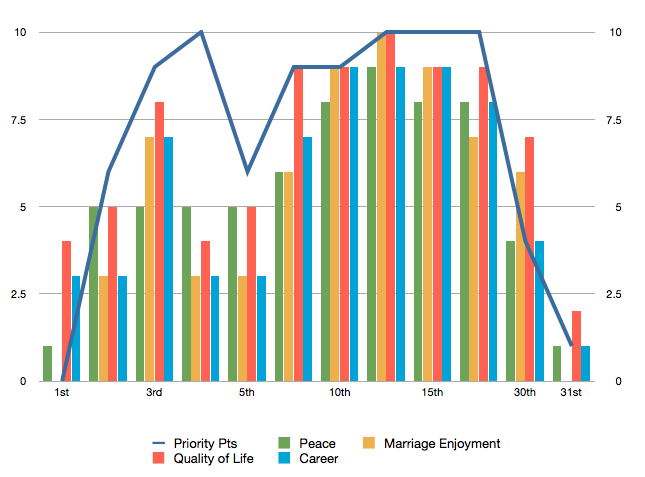Can Marriage Be Life’s Greatest Asset?
(Read time: 7 minutes)
3 years ago, a Jewish Rabbi named Shalom Arush changed my life forever. And who wouldn’t love a guy with a name like Shalom Arush, especially when he looks like this…
He tells a story about a young couple that sat in front of him in the midst of a typical marital crisis. The woman spoke first.
She, like many modern wives, felt that her husband didn’t have the time for her and the kids, and no matter how many ways she would ask, he still never came home from work on time.
The man countered…
Rabbi, believe me that I don’t waste time. My schedule is simply jammed from morning until night and urgent situations needing my attention are a commonplace. Is this my fault? And, in the end, my overtime is for the sake of my wife and my kids. I wouldn’t come home late unless there was a legitimate reason to.
The Rabbi politely let him finish before responding.
“You’re dead wrong. All of your problems (financial, relational, marital…etc) are because your marriage isn’t your highest priority. The gains that a spouse will feel on both a spiritual and MATERIAL level defy description, once they make their marriage first place.”
The Rabbi had lost me with such a disorienting claim. He had lost me because the claim protests my deeper (and mostly subconscious) persuasion that success as an entrepreneur, or any professional, requires that career takes the throne of my priorities and remain there for, at the very least, a couple of years.
Yet, seeing as my recent pattern of caring about work over marriage had produced little more than paying bills and a miserable wife, I figured giving the Shalom’s derailing hypothesis a test drive couldn’t hurt.
Putting Jewish Rabbis to the test.
I made Shalom’s claim my hypothesis and put the scientific method to good use.
THE TIMELINE.
31 days seemed to be enough of a period to get a substantial read on the accuracy of the hypothesis as any.
THE HYPOTHESIS.
This would be a claim to be tested through the introduction of independent variables & dependent variables, and measured against one another. I took this straight from Shalom.
“If one was to make their spouse feel more important than any other part of their life, they would experience benefits in all other areas of their life.”
THE INDEPENDENT VARIABLE.
These were the experimental efforts introduced into my marriage that were expected to produce an additional result. In my case, I did the same 4 things everyday to intentionally communicate to my wife that she was more important to me than my career.
One. I would tell her I loved her and one thing I love about her as the absolute FIRST thing I did each day.
Two. I would reach out to her 2-3 times during my work day via call, text, email, FB post or a lunch date.
Three. On the way home from work, I would mentally transition out of work-mode to be able to make her and her day my one focus when home.
Four. I would intentionally emotionally connect with her at least once a day. This often took on the face of a conversation alone, praying together or sex.
I would then rate my efforts day by day on a scale from 1-10. A perfect ten in these PRIORITY POINTS indicated that I executed all four variables with sincerity (as opposed to obligation). My score would drop from there depending on my lack of execution or intentionality. Sadly, you will soon see I have consistency issues.
THE DEPENDENT VARIABLE.
These were the dynamics that are expected to change with the introduction of the independent variable. In my case, I measured 5 different areas of my life on a scale from 1-10 every night before I went to bed.
Quality of Life. A score of 10 indicated general happiness & hopefulness about life. A day of stress, pessimism & short-sightedness was given a 1.
Peace in the home. A score of 10 indicated a day of complete serenity in our home, complete with no fights, no meltdowns & no complaining. A 1, on the contrary, alluded to a consistent presence of conflict. You know, ‘the nights on the couch’ kind of days.
Marital Enjoyment. A 10 was given when my wife and I wanted to be and enjoyed being around each other. A 1 was a day spent wanting to stay at work to avoid her and a deep interest in hiding when home.
Career Flow & Productivity. 10 was awarded for a focused & productive day at work. A 1, indicating an A.D.D & unproductive one.
Child’s Behavior. I gave the day a 10 when my 1.5 year old son wouldn’t exhibit any unwanted behavior such as meltdowns or tantrums. A 1 was reserved for the days my son would randomly walk into the room, melt to the floor and fluctuate between crying to screaming for the next 10 minutes.
To my surprise, a month later, I had a chart of data and a handful of ironic experiences demonstrating the eerily direct relationship that making my wife priority number one has with every other layer of my life.
The Results, by the numbers (and obnoxiously colorful graph).

Notice that the way every other color component of the graph above seems to follow the blue line. This implies that my life experience is heavily influenced by the level of intention with which I invest in to my wife. Simply put, when I gave my wife priority number one, every layer of my life profited.
The data doesn’t lie, and apparently neither does the Rabbi.
The Results, by the experiences.
The perks of this newfound priority structure were tangible.
From nights on the couch to expedited conflict. Previous to the last 31 days, it was a weekly exhibition for my wife and I to let our tempers escalate to a level ten and then stubbornly make them remain there for hours as if the emotional efforts of the first one to back down were in vain. Yet, as my wife felt more important to me, I began observing our conflict, though still very much in existence, rarely hit an eight. And even when the tempers did flare, the time allowed for them to hang around seemed to dramatically decrease.
From rants to enjoying the moments. For the most part of the previous year, every time my wife finally got my attention, she had so much resentment and frustration pent up, that we would spend the little focused time we had trying to work through the comment i made 6 days ago. Over the 31 days, she seemed to spend less time making sure I was acutely aware of our relational deficiencies, and subsequently, we spent more time actually enjoying our moments.
From a bottomless love tank to empowerment. Previously, when my wife’s basic emotional needs werent consistently being met, she was far more inclined to pull me away from things I loved and that refueled me. This made for a perpetual cycle of her needing me in 5th gear when I didn’t have the gas in my tank. However, I began witnessing the most bizarre behavior from this previously needy wife. She started asking if I wanted to watch football or grab a cigar with the boys. It was as if the more important she felt to me, the more she championed things that allowed me to relax or made me come alive.
From competing to contributing. My marriage – and it’s constant conflict – went from being the greatest resistance to my productivity to becoming one of my career’s most valuable assets. On the days my wife genuinely felt valued, she advocated for me to invest deeply into my work. It was as if she stopped competing for my attention with my career, and ‘joined my team’ to partner in my career with me. Remarkably, prioritizing my wife OVER my work became a way to invite her IN TO my work.
Having the closest person in my life champion me in my career pursuits has been the most professionally empowering thing I’ve experienced.
And finally, the Conclusion.
When given it’s rightful place in our priorities, Marriage can go from being just another thing we have to maintain to becoming the greatest asset to every other layer of our lives.
THEN, THERE’S THE FINE PRINT.
1. Every marriage has it’s own uncontrollable variables. Though I believe the principle to be universal, the investment of making our spouse a priority will return differently to everyone in both practical outcomes and timeline.
2. This 31 day experiment alluded to the return on investment being overnight. And though, in my case, there was very tangible return that was noticed quickly, this is generally not the case.
3. This experiment implies for a man to take 100% of the marriage’s responsibility on his shoulders. However, a healthy marriage isn’t simply the result of a man making his wife a priority – as much as it is two people taking 100% of the responsibility for their relationship and making each other their priority.
(Due to a URL redirect catastrophe and an apparent vendetta Facebook has against bloggers, over 400 “likes” were deleted from this post. That said, feel free to LIKE it again, regardless if you have in the past or not.)


Pingback: Good Fathering has Little to Do with Fathering. | tylerwardis()